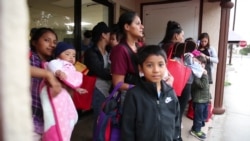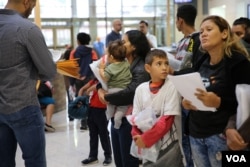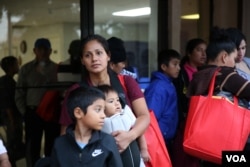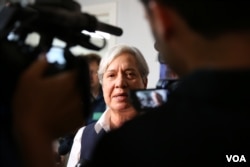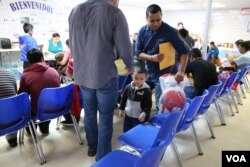The moment Lucia’s children asked her for food and she did not have anything to give them, and no way to get it, was the last straw. Lucia decided to take on the journey to the United States.
“That was the hardest moment for me,” she told reporters on Tuesday after arriving at the Humanitarian Respite Center in McAllen, Texas.
Lucia is not her real name and though she wanted to tell her story, she still did not feel comfortable sharing her identity. Sitting next to the 21-year-old Guatemalan woman were her 3-year-old girl and 6-year-old boy. They had just been released from the McAllen Border Patrol Processing Center and were among of the group advocates are calling “the lucky ones.”
Separation anxiety
Lucia told VOA that people in Central America understand how difficult the journey to the U.S. border is, but they are not expecting children being separated.
“I’ve had not heard about this and I believe it is unfair. Like I told [CBP officers] ‘if you’re going to separate me from my children, please deport me and don’t take my children away from me,’” she told VOA.
Separating families is part of the Trump’s administration Zero Tolerance policy under which those detained entering the United States illegally are being criminally charged, a policy that leads to children being separated from their parents because under U.S. law children cannot stay with a parent facing criminal charges.
Art Arthur with the hardline-on-immigration Center for Immigration Studies says the policy has a strategic aim: “It is a deterrent. The only way that we’ll really know whether it works is when we see the numbers for June, July and August.”
Yellow envelopes
Lucia was not expecting that her children might be taken away from her. She was also not expecting to see some of the things she saw inside the detention center.
“There was a woman that she would wake us up to count us. Since it was so cold inside and some children were able to sleep, some mothers would get up and didn’t want to wake up the children,” Lucia said.
“So, the officer kept saying, ‘Wake your children’ and when the mothers did not do it, the officer would come and grab the children and said ‘Wake up and go with your mothers,’” the Guatemalan woman said.
However, she landed at the humanitarian center where immigrants can rest, take a shower, check email, and receive instructions on what to do next. They can also get in touch with family members and arrange to buy bus tickets and travel to their final destination in the United States.
People at the community center on Tuesday carried big yellow envelopes. Inside? Papers that indicate they have an appointment with immigration. The papers explain that once they attend this appointment, they will receive their court date and receive instructions on what to do until next time inside the immigration court.
At the first appointment with the immigration judge, they will be asked why they came to the United States illegally and if they have a credible fear of going back.
When people come to the U.S. seeking protection, they are permitted to file for asylum regardless of their immigration status. U.S. law offers asylum to those people facing persecution in their home countries on the basis of race, religion, nationality, political opinion or membership in a particular group.
Others are hoping to ask for temporary protection.
‘Lucky ones’
Fifty to 100 people arrive at the center almost every day. Lucia and the other families were released because of a discretionary decision among the Border Patrol, often because of the sheer volume of people being held at detention centers.
The discretionary enforcement decision allows Customs and Border Protection field supervisors to decide who they will stop, question, and arrest – and who they will release.
The ones at the center were released, not separated from their children, and given a chance to prove their credible fear case in an immigration court.
“This is a children’s crisis,” Sister Norma Pimentel, executive director at the Catholic Charities Rio Grande Valley and one of the leaders inside the Humanitarian Respite Center, told VOA.
“They’re not criminals. No criminals. They’re children. They’re human beings. They’re families,” Pimentel said.
Legal basis
There is no law requiring the separation of immigrant families at the border, however, if people are caught crossing the U.S. border without authorization and between official ports of entry is a misdemeanor crime.
Charging someone under the federal criminal statute has been historically reserved for those who committed serious or heinous crimes or those with a vast criminal record.
“The previous administration was also very focused in deportation and also created a way to keep families from being released and put in family detention. This administration has focused more harshly in pushing back and send a deterrence message that really goes to the extreme,” Pimentel said.
And she doesn’t think the message is going to be heard.
“A mother that has a kid that is suffering, nothing will stop her from saving her son,” sister Pimentel said.
Pimentel’s Humanitarian Respite Center is open from 8 a.m. to 8 p.m. has assisted thousands of people and the Catholic sister has no plans in stopping the work.
“Every people that I am able to [I hope to help],” she said.




